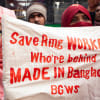11 years is a long time to wait for justice

In a country where a tragedy is never far away, few people may remember the details of the 2012 Tazreen Fashions fire that left 117 workers dead and many others injured. But for those who lost their loved ones and those who must carry the burden of physical disability for life as a result of the tragedy, it is still a nightmare that haunts them. More so because 11 years after the incident, the main accused in the case—the owner of the factory and some of his associates—have not received any sentence, and are out on bail. Reportedly, there are 104 witnesses to give testimonies in this regard, but only 11 have so far done that. The state has not been able to bring in the remaining witnesses to record their statements, hence the delay.
So far, none of the families of the deceased or those injured have received proper compensation. Many are left with lifelong chronic pain and disability restricting their ability to earn a living. But why must the victims suffer so much and for so long? This is a classic case of how justice eludes the poor and marginalised sections of our society. Otherwise, why would a case that had all the evidence of blatant negligence of the administration and authorities of the factory still drag on for 11 years, with no sign of any kind of prosecution of the accused?
Media reports have already established the gross negligence of Tazreen Fashions authorities. The factory building had no fire exit; the only available exit was blocked by piles of factory materials, much of which were flammable; and the collapsible gates of most of the floors had been kept locked to prevent theft, forcing workers to try to escape by breaking windows and exhaust fans, thus breaking bones or sustaining other injuries after jumping off the building. Those who could not make it out were burnt to ashes. After such compelling revelations, it is unfathomable why this case has not ended or due compensation has not been given to the victims.
Eleven years is far too long for these families and survivors to wait for justice. Ironically, this anniversary comes at a time when garment workers are demanding, unsuccessfully, a living wage for their labour. Once again, the interests of owners are being protected at the expense of helpless workers. This cycle must be reversed. We urge the authorities to intervene to ensure that the victims of Tazreen tragedy get justice without further delay—this includes punishment of the accused as well as adequate compensation for all victims. Anything less will only worsen the discrimination faced by the less privileged sections of our society.


 For all latest news, follow The Daily Star's Google News channel.
For all latest news, follow The Daily Star's Google News channel. 







Comments